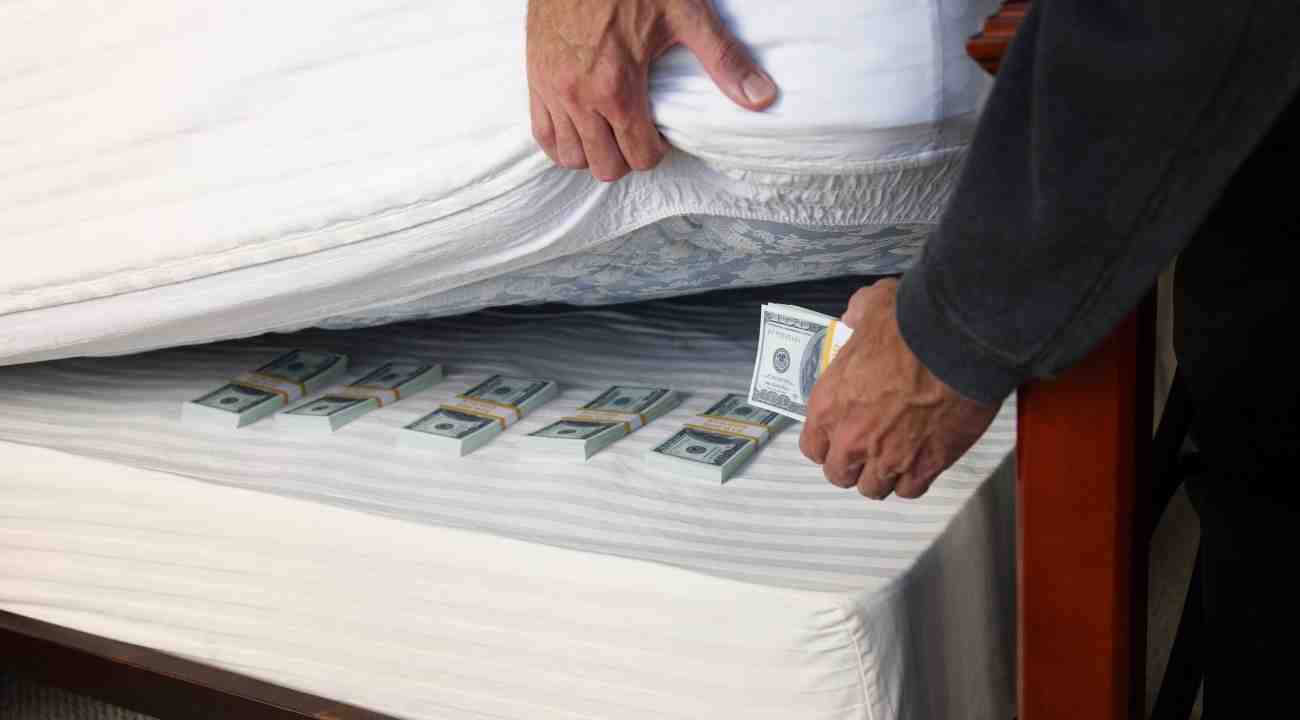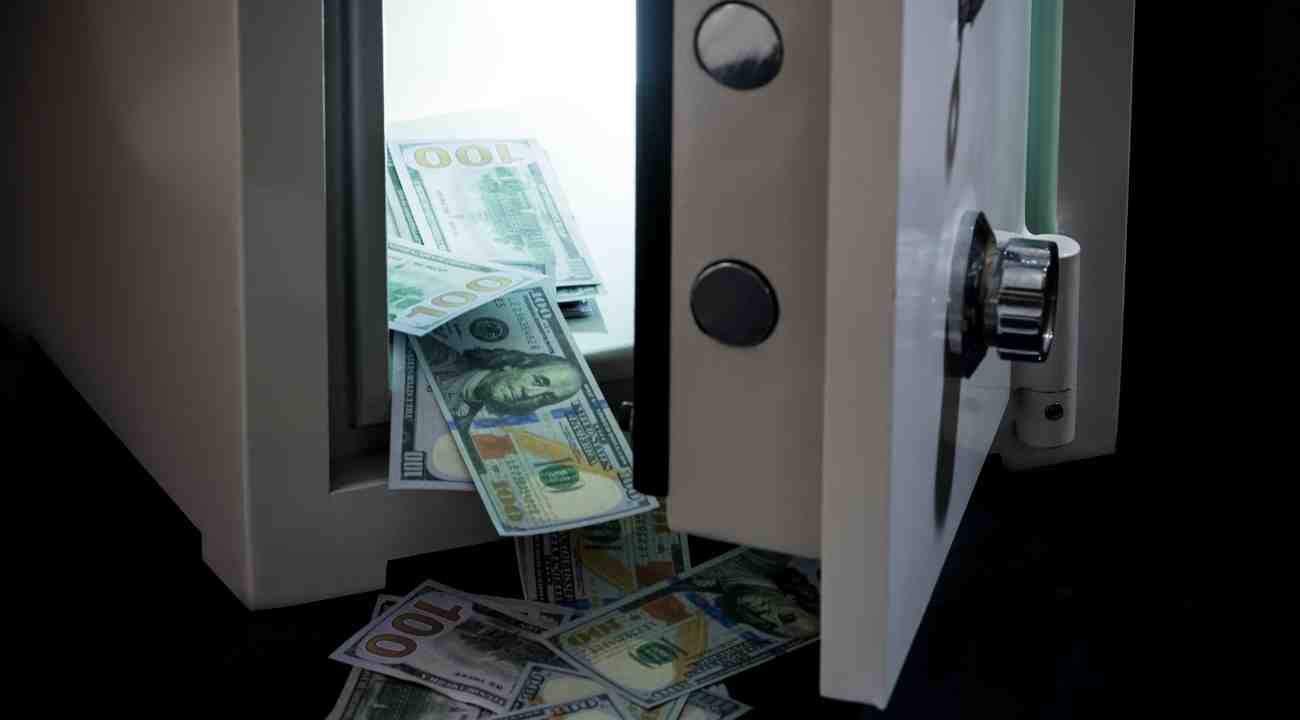Most people put their funds in savings accounts at a financial institution. While a bank account is a reliable way to hold money and keep it safe, sometimes it's a good plan to keep cash at home as an emergency fund. If you want to keep your cash just as safe as in a savings account, where should it go?
In this post, I'll explore the safest places to keep cash at home and much more. Hint: it's not under your mattress! Let's get started!
How Much Cash Should You Keep at Home?
No amount of money is right to keep at home. The financial situation of everyone varies. Some recommend keeping enough money safe to provide support for at least two months. If you want to feel safer, hold onto enough to cover your family for three to six months to bring more peace if a disaster occurs.
The number also depends on how comfortable you feel with cash inside your home.
Are you comfortable keeping a small amount, or do you want to put most of your savings under your roof? Whatever number makes sense to your family is the number you should work to keep protected.
Why Keep Cash at Home?
What is the point of keeping money inside the house? Why hold onto funds when you can put all of your cash in banks and let it be? There are a few good reasons to keep part of your income in a safe place at home.
A few of the most common include:
-
Tipping: If you have a delivery for food, you might want to tip them in cash.
-
Natural disasters: In natural disasters, electronic banking can go down. Money here is a good backup.
-
Power outages: Extra funds can make it simpler to get through extended power outages.
-
Cash emergency: Sometimes, emergencies appear where cash is needed. You'll always have it on hand.
Paper money can come in handy during these times, and you'll have access to it fast.
If you have privacy concerns and are worried about your ability to help the funds stay safe, we can help you out. Let's talk about some of the safest places to keep cash at home.

Don't worry – we hate spam too. Unsubscribe at any time.
Safest Places to Keep Cash at Home
Here are a few of the safest places to keep money inside a house. A few of these might seem crazy, but that's the point. The wilder, the less likely any home invaders will be able to find the extra cash.
The safest places include:
-
Safes
-
Yards
-
Picture frames
-
Decoy Safes
-
Fish tanks
-
Cat litter boxes
- Ceilings
Safes
The safe is the obvious choice when it comes to keeping funds protected.
You should invest in a fireproof or waterproof safe to keep your cash safe from natural disasters that might impact your home.
Ensure you invest in a high-quality safe that can withstand pressure. Consider bolting it to the ground in an area of your house where people do not visit often. Once it's secure, you can work to disguise it to draw attention away from the defense.
You want to purchase high-quality due to the material and the lock. Cheap surface is easy to cut into, and a low-quality lock is simple for an intruder to pick. It takes a little cash to keep your funds safe.
Yards
If you don't mind doing a little digging, a yard is another ideal location to keep your money safe. Find a plastic bag or a glass jar and put all your cash inside. There are even boxes and pipes sold in stores specifically to bury money.
Next, find a place in your yard ideal to hide cash. Bury it to a depth that you feel will keep the money inside safe. When burying in your yard, ensure you pick a location where the money won't get wet.
Picture Frames
Many people store their extra money in the back of picture frames. Pictures frames are ideal because they look unsuspecting, and they have rarely moved around. You can slide the cash in the back, hang up the picture, and hide it in plain sight without anyone else knowing.
First, slide the cash inside an envelope. You will need to seal the envelope as much as possible. Lick it and tape it. Next, find a frame that will hold the envelope. Tuck it in the corner and ensure it will stay, fasting it down with tape.
Once the money is attached, hang up the picture. Ensure you note down where you put the cash so you don't forget about it when it's needed.
Decoy Safes
There are many decoy safes out in the world, a lot of them fire-resistant and waterproof in case of natural disasters. Decoy safes come in tons of shapes and sizes. They're designed to look like another object, throwing off any burglars that might find themselves in your space.
You can find decoy safes that look like:
-
Soup cans
-
Shaving cream
-
Mirrors
-
Books
-
Benches
The opportunities are endless.
Decoy safes are great if you want to keep the money simpler for yourself to locate, but you don't want to make it clear that there's a safe in your home. You can even build a decoy safe for yourself if you're good at working with materials.
Fish Tanks
If you don't mind water, fish tanks are excellent places to keep money out of sight. Find a plastic bag or another easily sealable item to put the money inside. Ensure no air bubbles are in the bag or gaps where water can drip inside once the funds go into the tank.
You will need a fish tank with a gravel bottom for this hiding process. Once you have the money in the bag, stick it underneath the gravel in the fish tank. Ensure there is enough on top to cover the money.
A fish tank is somewhere few people would ever think to look for money. There is a risk of it getting wet, so ensure it's sealed. You might even want to test it on one bill first to see if you've mastered the sealant process.
Cat Litter Boxes
If you want to pick a place no one will ever look, put your cash in a litter box. It's gross, yes. But, the money is protected in a plastic bag. Everything on top serves as an extra layer of defense against intruders searching for wealth in your home.
First, ensure the funds are sealed in a plastic bag. You can even use a box if your litter box is big enough. Empty the litter box. Then, before replacing the litter, put the money inside. Put enough fresh litter on top to cover the money. Once it's out of sight, you're good to go.
Once you need the money again, you will need to dump out all the litter. The bag or box might be gross, but the money inside will be as good as new.
Ceilings
Depending on how much you have to store, putting your money in a ceiling can be a great hidden location to safely store cash.
Just remember what area of the ceiling you stored your money and you'll need to do some good patchwork to ensure it's not noticeable to anyone.
Where To Avoid Placing Cash at Home
There are many excellent places to hide cash at home, but there are poor places to store funds. Let's talk about some locations you should avoid placing money to keep it as safe as possible. These will not provide adequate defense for your valuable.
A few of the worst locations to hide cash include:
-
Mattresses
-
Jewelry boxes
-
Forgettable locations
You will lose money this way.
Let's dive into each of these spots so you can understand why they're not ideal for storage. If you have nowhere better than these locations, you're better off depositing money in banks. Consider which is the better option for your life.
Under a Mattress
We've all seen the movies where the protagonist hides money underneath their mattress. Unfortunately, this spot isn't ideal for storing money.
Most of the time, burglars start their search by looking in bedrooms. Your bed will be one of the biggest targets in the room, leaving the cash vulnerable.
It doesn't matter if you're putting the money inside a safe or not if you keep it under the bed – thieves are prepared to address all of these items. Make it harder for intruders and keep your funds away from the place you sleep.
Jewelry Boxes
Jewelry boxes are already built to house valuable, so thieves will check them first. If you have jewelry in there along with the cash, you're practically handing intruders everything that should have been hidden.
If you have a jewelry box inside your home, it should go inside a safe as well. Don't leave anything valuable out in plain sight if you're concerned about it. Cash should be kept the most protected of all, and jewelry boxes are not the place to hide it.
Forgettable Locations
Finally, there are plenty of forgettable locations people hide money.
This place might include a children's toy, an oven, or a strange drawer in a dresser in the attic. Never store your money in items where you will forget about them. Also, never put your funds inside something that moves around constantly. You might end up losing your cash.
When you hide your money, ensure you write down the location and keep the note with you. These actions will make it easily accessible when the time comes to put it to use. Safe places have no meaning if you can't remember them when you need them.
How to Keep Money Safe At Home
If you have a large stash of cash that you want to keep safe at home, there are a few things you should keep in mind.
- Don't hide money in places you forget about
- Write down where you keep cash in a locked, digital device that only you have access to
- Don't keep massive amounts of cash at a single location, instead spread it out across multiple locations
- Use a bank to keep your money safe and FDIC insured
Final Thought on the Safest Place to Keep Cash at Home
Although it's not something everyone has to do, keeping cash at home is an excellent way to have a backup fund in case everything goes wrong.
Put your funds in a safe spot, that's hidden and easily accessible in an emergency. If you have a little extra you can lean on at any moment, it will make it much easier to lay back and relax. Plus – you'll always have cash on hand.
Storing money inside the home isn't for everyone, but it's worth a shot. You can avoid paying interest and fees that come with some financial institutions.

Don't worry – we hate spam too. Unsubscribe at any time.



